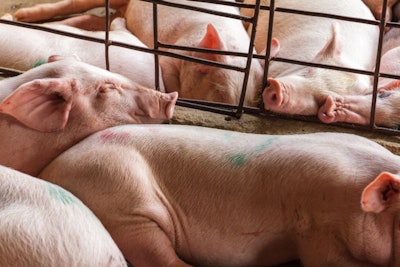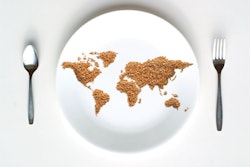
Justices expected to rule on case early next year
The Supreme Court of the United States heard oral arguments October 11 in a lawsuit challenging California’s Proposition 12, which bans the sale of pork from hogs that don’t meet certain production standards.
Arguing for the National Pork Producers Council (NPPC) and the American Farm Bureau Federation (AFBF), Timothy Bishop of law firm Mayer Brown L.L.P. in Chicago challenged the constitutionality of the law, saying it violates the Commerce Clause and fails the Pike balancing test.
The Commerce Clause grants Congress the power to regulate trade among the states and restricts states from regulating commerce outside their borders, except for matters related to public health and safety. The Pike balancing test refers to Pike v. Bruce Church, a case from 1970 in which the Supreme Court found that, to be constitutional, the burdens a state or local law imposes on out-of-state commerce must not be clearly excessive in comparison to the local benefits.
“We have a 450-paragraph complaint supported by declarations that says that there are immense costs involved for the industry, immense harm to pigs that will result from complying with Prop 12, and no safety benefit,” Bishop said. “You have a dozen pork farmers in the court today who would testify at trial that they are being forced by distributors and packers and retailers to comply with Prop 12 in a way that they think kills pigs that harms their workers. That makes it extremely difficult for them to operate their farms in the way that they think is efficient and safe for workers and pigs.”
Justice Neil Gorsuch asked Bishop whether he thought it would be permissible for a state to ban the sale of pork outright rather than dictating how the pork should be raised.
“Say California could ban pork, why doesn’t that affect interstate commerce in some impermissible way?” Gorsuch asked.
“Well, it does affect it, but the difference between a ban is that seems, to us, to be much commonplace and they’re much more in-state focused,” Bishop said. “All they do is reduce the size of the market for out-of-state businesses. That is very different from conditioning a sale on the precise way that an out-of-state business conducts itself.”
Justice Elena Kagan asserted that the reason out-of-state businesses care about changing production methods is that other production methods are more costly.
“And if you’re thinking about costs, California banning your product would be the greatest cost of all,” Kagan said.
But Bishop said this issue is about more than just cost of production.
“We’re not only talking about costs, Justice Kagan, we’re talking about the impact on the state where the business is located,” he said. “Iowa has 65,000 sow farms. It has a very great interest in how those sows are housed.”
U.S. Deputy Solicitor General Edwin Kneedler, appearing as a friend of the court supporting NPPC and AFBF, said Proposition 12 is invalid because it “imposes a trade barrier based on conduct beyond California’s borders. It fails to respect the autonomy of California’s sister states. It invites conflict and retaliation and threatens the balkanization (or fragmentation) of a national economic union.”
“A state’s interest in protecting the health and safety of its residents can support a state law if that local interest is substantial, and not outweighed by its effects on commerce. But the state here has taken the position that Proposition 12 does not rest on any scientific determination of such a basis, and petitioners also plausibly allege that Proposition 12 does not substantially advance such an interest,” Kneedler said, arguing that the judgment of the U.S. Court of Appeals for the 9th Circuit from July 2021 should be reversed on the basis of Pike.
Kneedler said that if Proposition 12 were upheld, it would set a precedent for one state to regulate actions in another.
“I think there would be a concern about inviting state laws regulating conduct in another state and the fact that it’s done through sales, as opposed to an outright prohibition. … What we have here is basically an attempt by California to regulate what is happening in other states. And as I said, that is a proposition that, once unleashed, would be difficult to contain,” he said.
Arguments in support of Prop 12
California Solicitor General Michael Mongan, arguing on behalf of the state, said Proposition 12 does not place restrictions on how out-of-state businesses produce pork for sale in other states. However, the NPPC has argued that U.S. pork producers serve 40 million consumers – or 15% of the U.S. pork market – in California, and to continue to do so under Proposition 12 would mean producers in other states would need to change their production methods.
“If (a state) adopt(s) a regulation that is just too burdensome to comply with, then the industry will stop serving a state and the state has to decide, ‘do we want a regulation or do we want pork?’” Mongan said.
He added the core of Proposition 12 is “state sovereign authority to control the products that are sold within our borders.”
Speaking on behalf of the Humane Society of the United States, Jeffrey Lamken of law firm MaloLamken L.L.P. in Washington, said Proposition 12 does not interfere with interstate commerce and instead is about “the sale within California of pork that Californians find immoral and unsafe, regardless of where it originates.”
Justice Ketanji Brown Jackson said that if this were a universally held idea, the market would have already accounted for it elsewhere.
“I don’t know what Iowa actually believes, but assume we have a state that thinks it’s not immoral to hold their sows in a particular way. To what extent does California get to control what Iowa does with respect to the housing of its pork?” she asked Lamken.
“It does not,” Lamken said, “but the question in this case is who decides the pork that appears on California grocery shelves that’s purchased and consumed by Californians to say that when another state has a lesser standard, it decides what appears on California grocery shelves?”
In his rebuttal, Bishop said allowing Proposition 12 to stand would create conflict between states.
“If California can condition sales on its moral or policy views, and every other state can do the same, we’ll be back to the pre-convention picture where you have balkanized markets and discord among the states,” he said.
A decision in the case is expected to be issued in early 2023.












